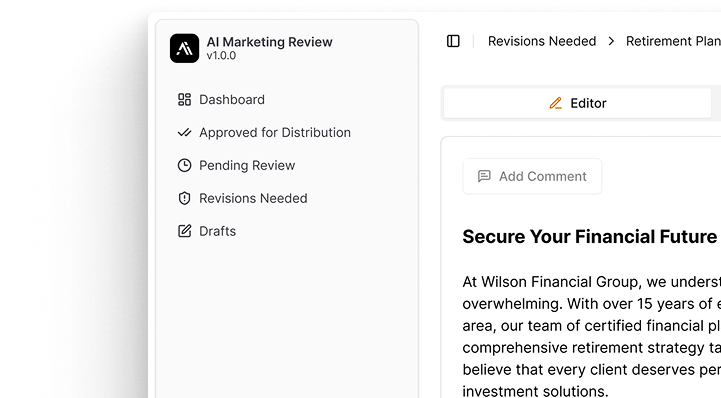Introduction
For broker-dealers and dually-registered firms, staying ahead of regulatory expectations isn’t just a best practice – it’s a business imperative. Among the most critical FINRA rules governing communications and recordkeeping are Rules 2210 and 4511. These rules shape how firms engage with the public and how those engagements must be documented. But while their intent is clear, their practical application often leaves room for interpretation and risk.
In this blog, we break down both rules, their intersections, and what compliance teams need to do to ensure marketing oversight and digital recordkeeping processes align with FINRA standards.
FINRA Rule 2210: Governing Communications with the Public
Rule 2210 governs all broker-dealer communications with the public, dividing them into three primary categories: retail communications, institutional communications, and correspondence. The rule establishes content standards designed to protect investors from misleading claims and ensure all communications are fair, balanced, and accurate.
Key requirements include:
- Pre-Use Approval: Retail communications must be approved by a registered principal before use.
- Recordkeeping: Firms must maintain records of all communications for at least three years.
- Filing Requirements: Certain retail communications must be filed with FINRA within 10 days of first use.
- Content Standards: Communications must be based on principles of fair dealing and good faith, providing a sound basis for evaluating investments.
Where firms often get tripped up is in the fast-moving world of digital marketing. Social media posts, website updates, videos, emails may all fall under Rule 2210 and require appropriate review and documentation.
FINRA Rule 4511: Recordkeeping Requirements
Rule 4511 governs how member firms create and preserve books and records. It doesn’t stand alone but rather complements SEC Rule 17a-4 by reinforcing retention requirements.
Key provisions include:
- Preservation of Records: Firms must retain communications records for at least three years, with the first two in an easily accessible place.
- Format & Accessibility: Records must be kept in a non-erasable, non-rewritable format (i.e., WORM-compliant).
- Supervisory Oversight: Firms are responsible for implementing procedures to ensure recordkeeping compliance.
Importantly, Rule 4511 applies to all written communications relating to the firm’s business, including digital formats such as texts, emails, chat, and social media messages.
Why These Rules Matter Together
While Rule 2210 focuses on how firms communicate, Rule 4511 ensures those communications are properly archived. Together, they create a compliance double-bind: every outward message must meet content standards and be preserved in a compliant format.
This is where firms often face challenges:
- Is your social media content pre-approved and retained?
- Are text message conversations with clients properly archived?
- Can you produce an audit-ready report in minutes, not days?
Modern communications create regulatory complexity. Compliance officers need tools that make these obligations manageable without slowing down business operations.
How Archive Intel Helps
Archive Intel’s AI-powered platform is designed to align with FINRA rules like 2210 and 4511. Our communications archiving solution captures every message across text, chat, email, social, and web automatically and in real time. Our AI Marketing Review tool adds a second layer of compliance by identifying high-risk language, suggesting compliant alternatives, and preserving a full audit trail of reviews and approvals.
- Reduce manual effort by up to 85%
- Eliminate 99% of false positives
- Generate audit-ready reports instantly
- Ensure WORM-compliant recordkeeping
With the right infrastructure, firms can reduce risk, improve efficiency, and maintain clear oversight without unnecessary complexity.
Final Thoughts
Rules 2210 and 4511 are foundational to FINRA compliance. Understanding their requirements—and how they interact—is essential for any firm committed to meeting regulatory obligations. As communication channels evolve, so must the systems used to manage them. Forward-thinking compliance officers are taking steps to ensure their tools and processes are up to the task.
Book a Demo to see how Archive Intel supports FINRA compliance across communications and marketing workflows.
